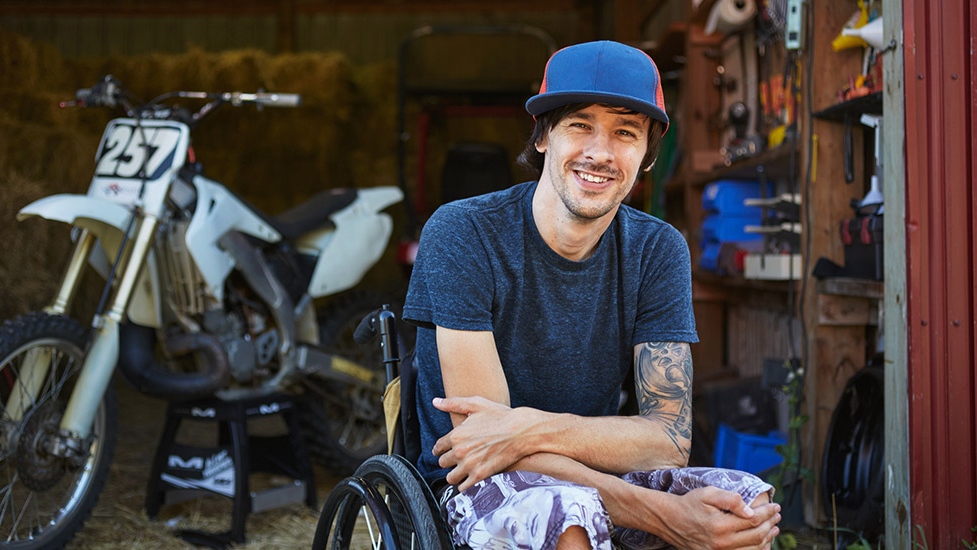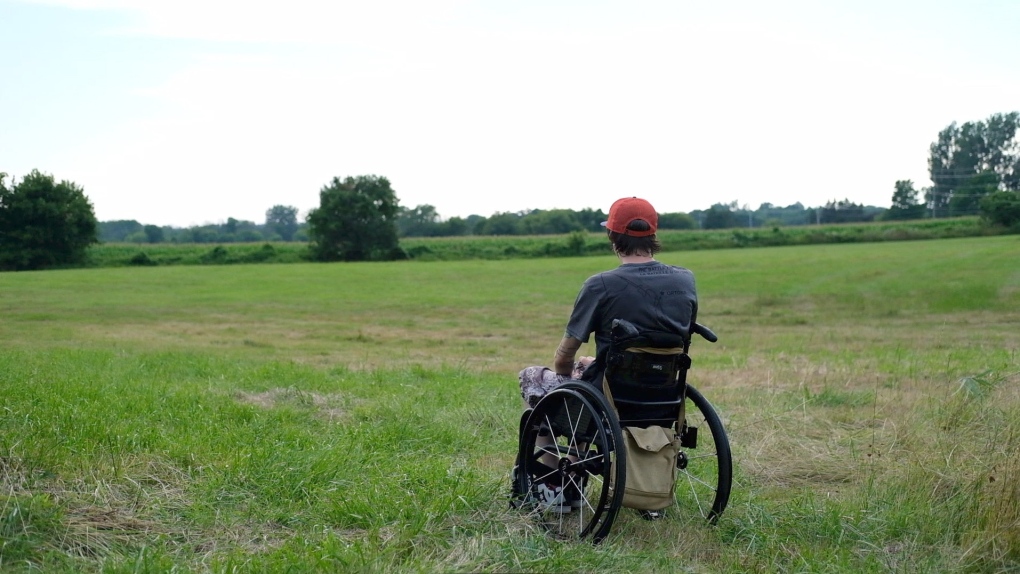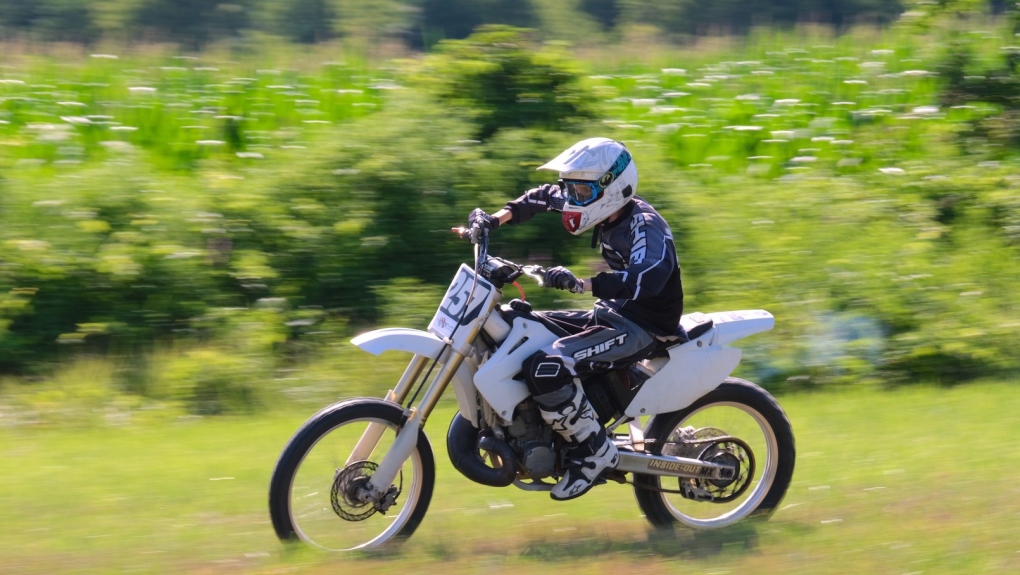Ontario man left quadriplegic after motocross accident gets back on the bike
 Former professional freestyle motocross rider Alex Abbott is seen in this undated image. (Sunnybrook/Jason Mortlock)
Former professional freestyle motocross rider Alex Abbott is seen in this undated image. (Sunnybrook/Jason Mortlock)
Almost 10 years after he was left quadriplegic following a motocross accident, an Ontario man is back on the bike and hoping to inspire others struggling with accessibility issues to stay the course.
“I was practicing backflips in Millbrook, Ont. into a foam put and I got stuck under the bike, lost my rotation and the bike landed on my head. And I broke my neck,” Alex Abbott recalls in a short documentary film about the life-changing incident titled ‘257 Down,’ which was released publicly on Friday.
- Download our app to get local alerts on your device
- Get the latest local updates right to your inbox
The former professional freestyle motocross rider was airlifted to Sunnybrook’s trauma centre after the accident. Doctors determined Abbott had critically injured his spinal cord at the C6 vertebra.
In an instant, the promising young rider from Colborne, Ont. became an incomplete quadriplegic, which meant varying paralysis from the neck down and the end of his pro dirt-biking career.
“It’s hard, when you’ve pretty much committed your life to something already, in your mind at least, and then it’s taken right when you were nearing your prime and then boom, within two months of everything coming together it all fell apart,” he recalled.
 Alex Abbott is seen in this undated image. (257down)
Alex Abbott is seen in this undated image. (257down)
Abbott was immobilized in the months that followed at Toronto Rehab’s Lyndhurst Centre, where he admits the thought of ever returning to the track seemed out of reach.
“I was always thinking, ‘Yeah, yeah, I’ll get on a bike again somehow.’ But also, in the back of your mind, you’re also realizing it might not be a very achievable goal,” he said.
But something changed in the days leading up the 10-year anniversary of the July 2010 accident. That’s when David Porteous, the film’s director, said he got a surprising call from Abbott.
“He knew that I did a bunch of motorsports photography…and he said to me, ‘Hey, I'm thinking about getting back on my bike, again, my friends are gonna come over, not sure how it's gonna go. But do you want to take some photos?’” Porteous, who’s engaged to Abbott’s sister, told CTV News Toronto in an interview.
The filmmaker said while he wasn’t intending to make a film that day, something compelled him to bring his video camera and recording gear.
“When I got there, there was kind of like an energy in the air. I was like, ‘Oh, something's happening here,” Porteous said. Although it’s hard to believe, Abbott was able to get onto the bike with some help from his friends and do a few laps on his own -- all of which was captured on video.
“Once you’re on that bike and it’s going, every bad feeling is gone, completely gone, and there’s just exhilaration,” Abbot said afterwards.
Since then, Porteous said Abbott has been working on ways to make dirt bikes more accessible, for himself and others, though he said the process has been challenging.
“There’s been some more talk about seeing what other accessibility innovations he can use on the bike. Whether it be a frame or something along those lines. So he’s trying to figure out how he can get back on and do these things, but it’s not easy because, you know, a [dirt] bike is not made for that.”
Now that the film is out, Abbot hopes it can motivate those facing similar physical challenges while also sparking a larger conversation around accessibility.
“There’s always more within you. You can always find that extra gear, go a little harder, hold on a little longer and the people that will support you, they’re more than happy to help you accomplish your goals and they certainly are attainable, one way or the other,” he said.
The film is available for purchase here and Porteous said one dollar from every sale be donated to Sunnybrook Hospital's Veterans Centre.
 Alex Abbott is seen in this undated image. (257down)
Alex Abbott is seen in this undated image. (257down)
CTVNews.ca Top Stories

Trudeau appears unwilling to expand proposed rebate, despite pressure to include seniors
Prime Minister Justin Trudeau does not appear willing to budge on his plan to send a $250 rebate to 'hardworking Canadians,' despite pressure from the opposition to give the money to seniors and people who are not able to work.
'Mayday!': New details emerge after Boeing plane makes emergency landing at Mirabel airport
New details suggest that there were communication issues between the pilots of a charter flight and the control tower at Montreal's Mirabel airport when a Boeing 737 made an emergency landing on Wednesday.
Hit man offered $100,000 to kill Montreal crime reporter covering his trial
Montreal news outlet La Presse says a hit man offered $100,000 to have one of its crime reporters assassinated.
Cucumbers sold in Ontario, other provinces recalled over possible salmonella contamination
A U.S. company is recalling cucumbers sold in Ontario and other Canadian provinces due to possible salmonella contamination.
Trudeau says no question incoming U.S. president Trump is serious on tariff threat
Prime Minister Justin Trudeau says incoming U.S. president Donald Trump's threats on tariffs should be taken seriously.
Insurgents breach Syria's second-largest city Aleppo in shock offensive
Insurgents breached Syria's second-largest city Aleppo after blowing up two car bombs on Friday and were clashing with government forces on the city's western edge, according to a Syria war monitor and fighters.
Here's how thick ice needs to be to park a truck on it, according to Sask. Water Security Agency
The Saskatchewan Water Security Agency (WSA) says ice should be at least one foot (30 centimetres) thick before it's safe to drive a car or light truck on a frozen body of water.
Democratic lawmakers from Connecticut report Thanksgiving bomb threats against their homes
At least six Democratic members of Congress from Connecticut were targeted by bomb threats on their homes Thursday, the lawmakers or their offices said.
Latest updates: Tracking RSV, influenza, COVID-19 in Canada
As the country heads into the worst time of year for respiratory infections, the Canadian respiratory virus surveillance report tracks how prevalent certain viruses are each week and how the trends are changing week to week.

































